Unit 5 Wild animals 知识清单译林版(2024)英语八年级上册
文档属性
| 名称 | Unit 5 Wild animals 知识清单译林版(2024)英语八年级上册 | 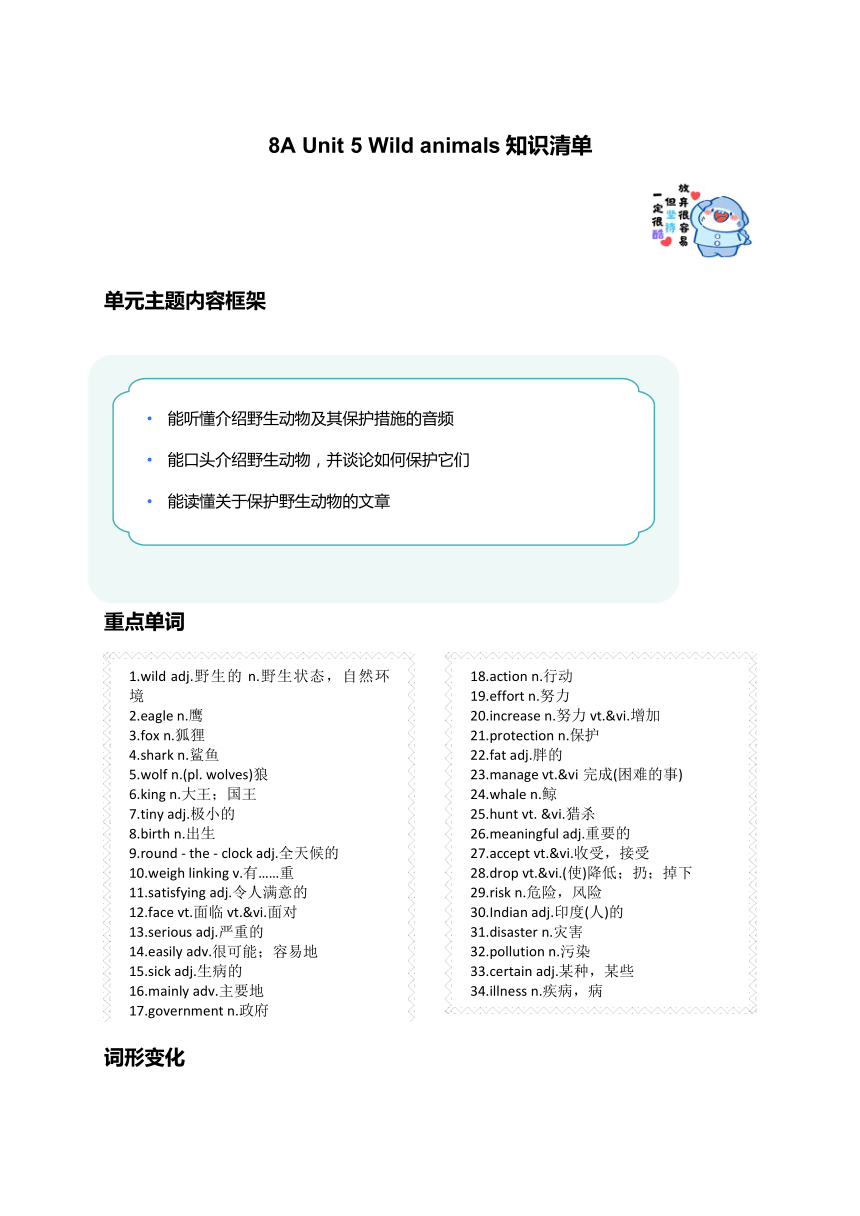 | |
| 格式 | docx | ||
| 文件大小 | 535.6KB | ||
| 资源类型 | 教案 | ||
| 版本资源 | 译林版 | ||
| 科目 | 英语 | ||
| 更新时间 | 2025-08-20 12:10:53 | ||
图片预览

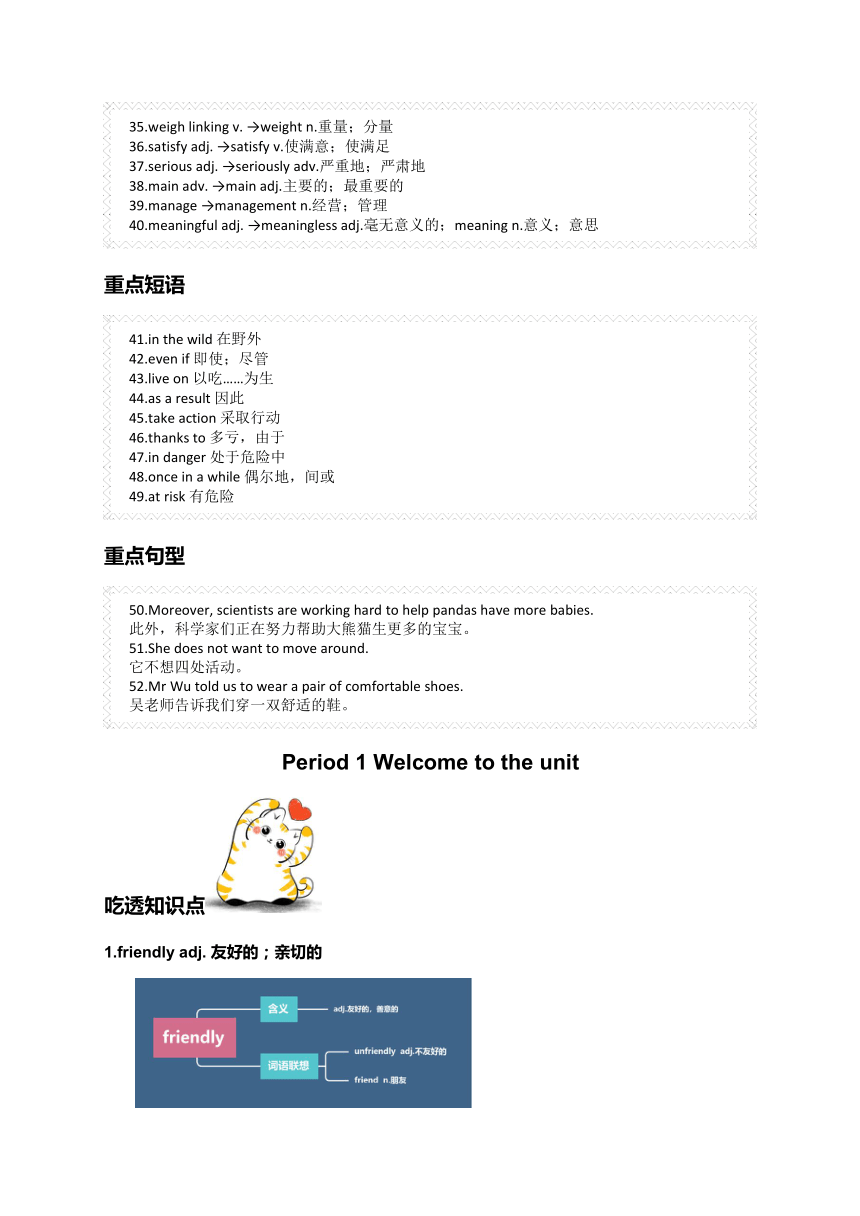
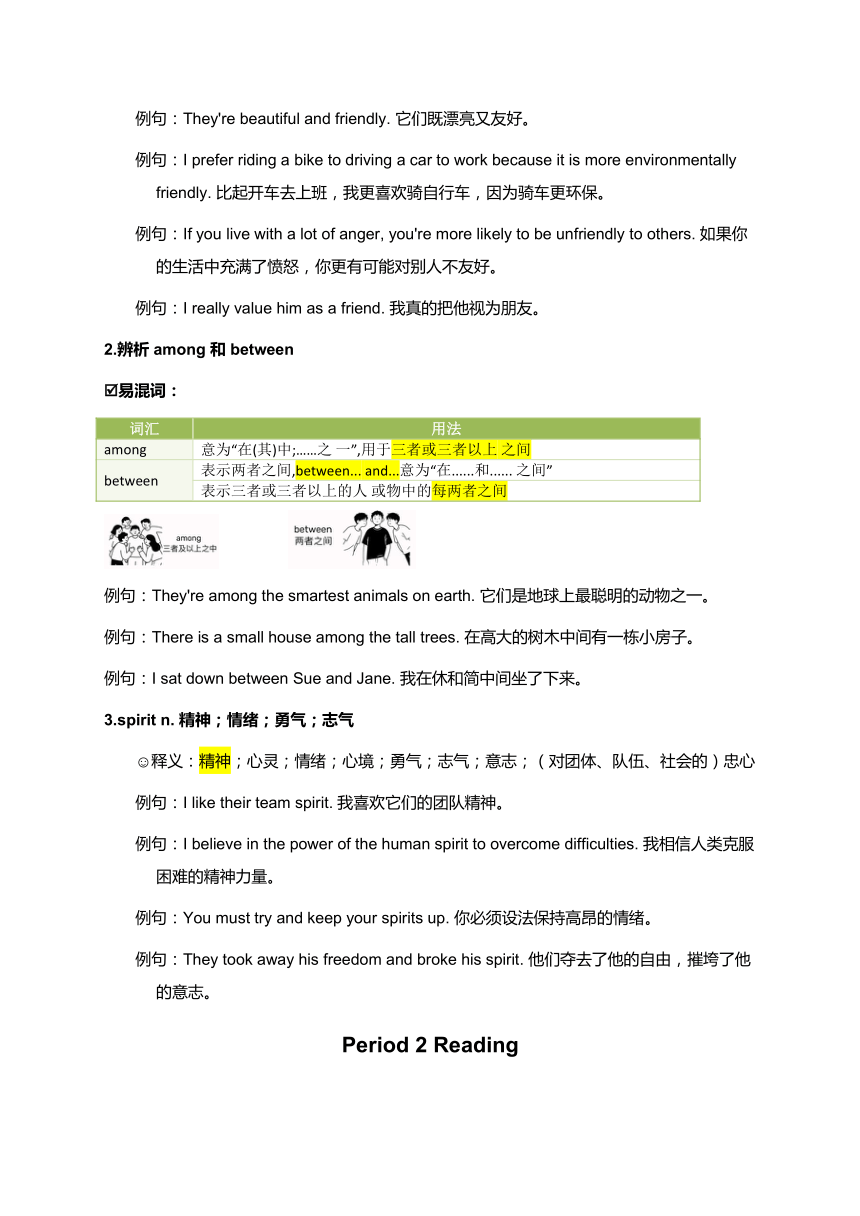
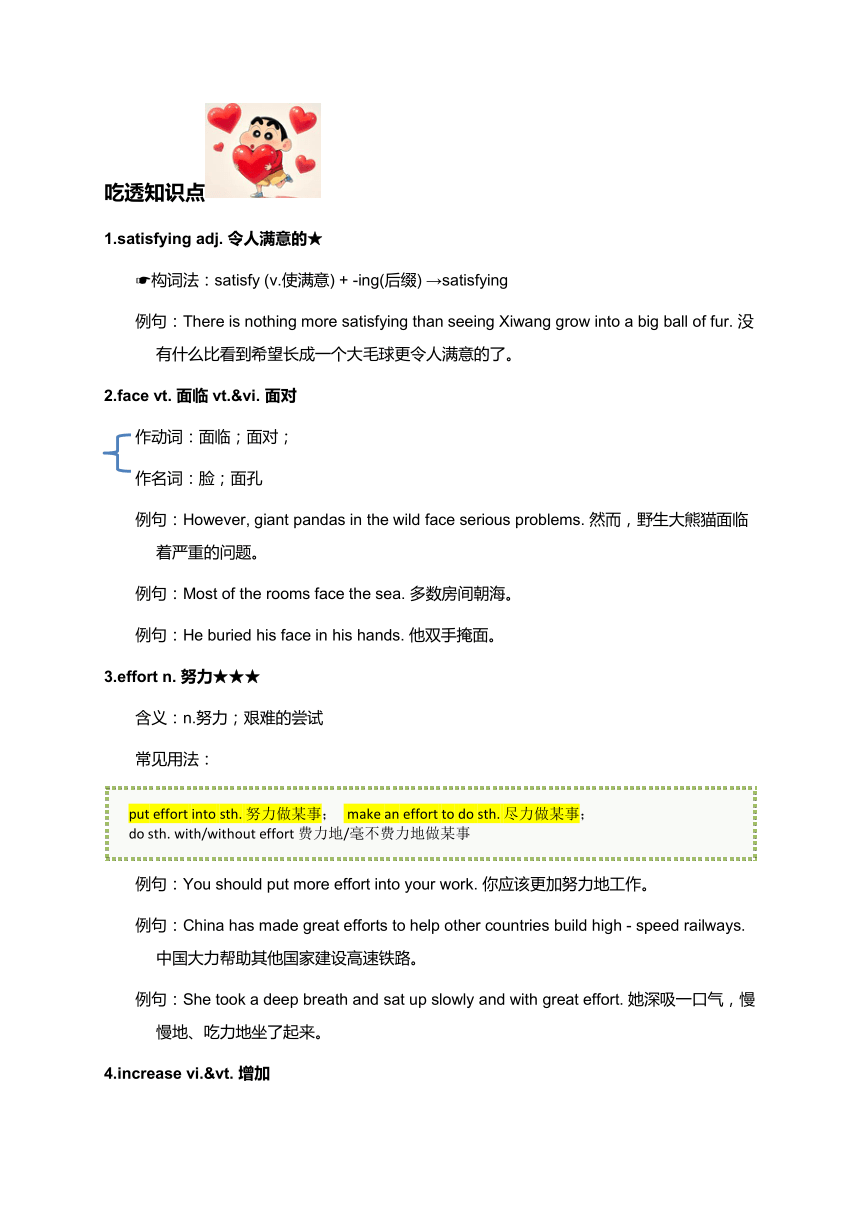
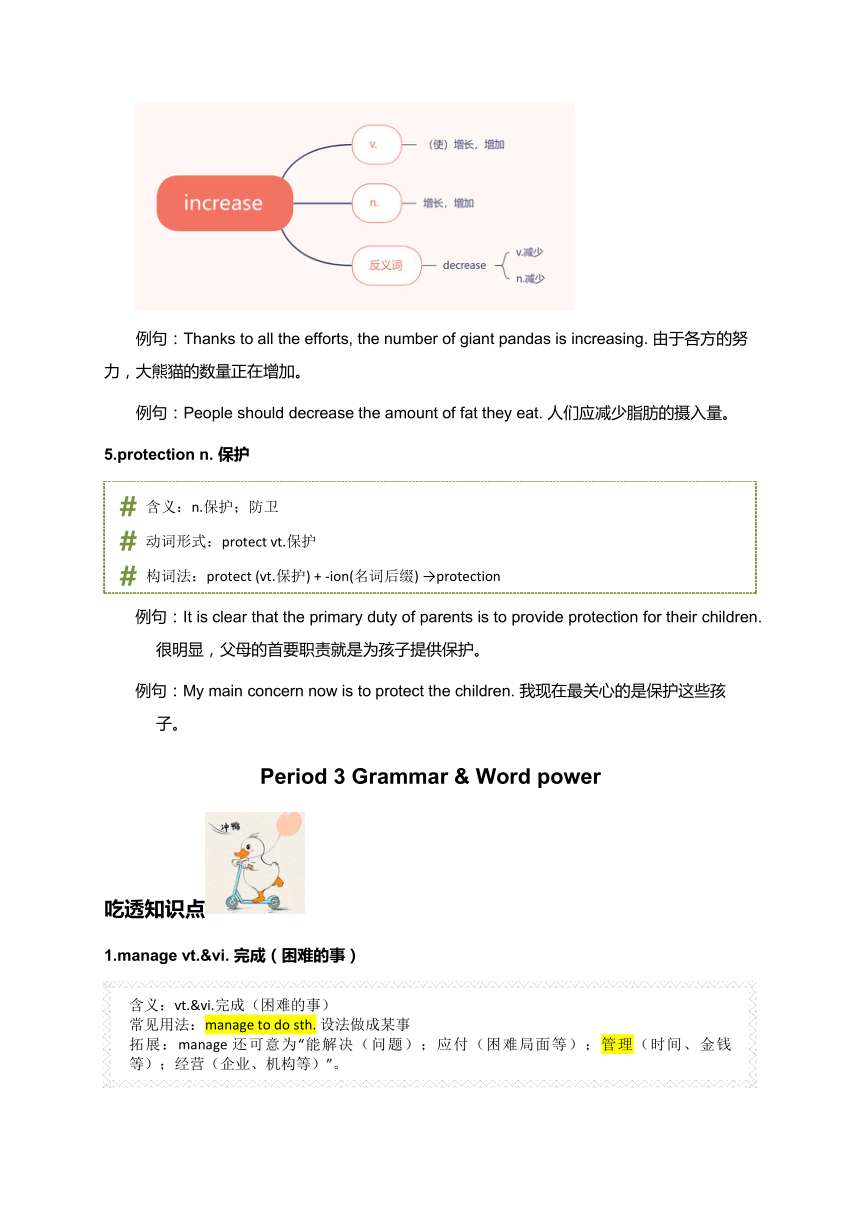
文档简介
8A Unit 5 Wild animals知识清单
单元主题内容框架
重点单词
1.wild adj.野生的 n.野生状态,自然环境
2.eagle n.鹰
3.fox n.狐狸
4.shark n.鲨鱼
5.wolf n.(pl. wolves)狼
6.king n.大王;国王
7.tiny adj.极小的
8.birth n.出生
9.round - the - clock adj.全天候的
10.weigh linking v.有……重
11.satisfying adj.令人满意的
12.face vt.面临 vt.&vi.面对
13.serious adj.严重的
14.easily adv.很可能;容易地
15.sick adj.生病的
16.mainly adv.主要地
17.government n.政府
18.action n.行动
19.effort n.努力
20.increase n.努力 vt.&vi.增加
21.protection n.保护
22.fat adj.胖的
23.manage vt.&vi完成(困难的事)
24.whale n.鲸
25.hunt vt. &vi.猎杀
26.meaningful adj.重要的
27.accept vt.&vi.收受,接受
28.drop vt.&vi.(使)降低;扔;掉下
29.risk n.危险,风险
30.Indian adj.印度(人)的
31.disaster n.灾害
32.pollution n.污染
33.certain adj.某种,某些
34.illness n.疾病,病
词形变化
35.weigh linking v. →weight n.重量;分量
36.satisfy adj. →satisfy v.使满意;使满足
37.serious adj. →seriously adv.严重地;严肃地
38.main adv. →main adj.主要的;最重要的
39.manage →management n.经营;管理
40.meaningful adj. →meaningless adj.毫无意义的;meaning n.意义;意思
重点短语
41.in the wild 在野外
42.even if 即使;尽管
43.live on 以吃……为生
44.as a result 因此
45.take action 采取行动
46.thanks to 多亏,由于
47.in danger 处于危险中
48.once in a while 偶尔地,间或
49.at risk 有危险
重点句型
50.Moreover, scientists are working hard to help pandas have more babies.
此外,科学家们正在努力帮助大熊猫生更多的宝宝。
51.She does not want to move around.
它不想四处活动。
52.Mr Wu told us to wear a pair of comfortable shoes.
吴老师告诉我们穿一双舒适的鞋。
Period 1 Welcome to the unit
吃透知识点
1.friendly adj. 友好的;亲切的
例句:They're beautiful and friendly. 它们既漂亮又友好。
例句:I prefer riding a bike to driving a car to work because it is more environmentally friendly. 比起开车去上班,我更喜欢骑自行车,因为骑车更环保。
例句:If you live with a lot of anger, you're more likely to be unfriendly to others. 如果你的生活中充满了愤怒,你更有可能对别人不友好。
例句:I really value him as a friend. 我真的把他视为朋友。
2.辨析 among 和 between
易混词:
词汇 用法
among 意为“在(其)中;……之 一”,用于三者或三者以上 之间
between 表示两者之间,between... and...意为“在......和...... 之间”
表示三者或三者以上的人 或物中的每两者之间
例句:They're among the smartest animals on earth. 它们是地球上最聪明的动物之一。
例句:There is a small house among the tall trees. 在高大的树木中间有一栋小房子。
例句:I sat down between Sue and Jane. 我在休和简中间坐了下来。
3.spirit n. 精神;情绪;勇气;志气
释义:精神;心灵;情绪;心境;勇气;志气;意志;(对团体、队伍、社会的)忠心
例句:I like their team spirit. 我喜欢它们的团队精神。
例句:I believe in the power of the human spirit to overcome difficulties. 我相信人类克服困难的精神力量。
例句:You must try and keep your spirits up. 你必须设法保持高昂的情绪。
例句:They took away his freedom and broke his spirit. 他们夺去了他的自由,摧垮了他的意志。
Period 2 Reading
吃透知识点
1.satisfying adj. 令人满意的★
构词法:satisfy (v.使满意) + -ing(后缀) →satisfying
例句:There is nothing more satisfying than seeing Xiwang grow into a big ball of fur. 没有什么比看到希望长成一个大毛球更令人满意的了。
2.face vt. 面临 vt.&vi. 面对
作动词:面临;面对;
作名词:脸;面孔
例句:However, giant pandas in the wild face serious problems. 然而,野生大熊猫面临着严重的问题。
例句:Most of the rooms face the sea. 多数房间朝海。
例句:He buried his face in his hands. 他双手掩面。
3.effort n. 努力★★★
含义:n.努力;艰难的尝试
常见用法:
put effort into sth. 努力做某事; make an effort to do sth. 尽力做某事;
do sth. with/without effort 费力地/毫不费力地做某事
例句:You should put more effort into your work. 你应该更加努力地工作。
例句:China has made great efforts to help other countries build high - speed railways. 中国大力帮助其他国家建设高速铁路。
例句:She took a deep breath and sat up slowly and with great effort. 她深吸一口气,慢慢地、吃力地坐了起来。
4.increase vi.&vt. 增加
例句:Thanks to all the efforts, the number of giant pandas is increasing. 由于各方的努力,大熊猫的数量正在增加。
例句:People should decrease the amount of fat they eat. 人们应减少脂肪的摄入量。
5.protection n. 保护
含义:n.保护;防卫
动词形式:protect vt.保护
构词法:protect (vt.保护) + -ion(名词后缀) →protection
例句:It is clear that the primary duty of parents is to provide protection for their children. 很明显,父母的首要职责就是为孩子提供保护。
例句:My main concern now is to protect the children. 我现在最关心的是保护这些孩子。
Period 3 Grammar & Word power
吃透知识点
1.manage vt.&vi. 完成(困难的事)
含义:vt.&vi.完成(困难的事)
常见用法:manage to do sth. 设法做成某事
拓展:manage 还可意为“能解决(问题);应付(困难局面等);管理(时间、金钱等);经营(企业、机构等)”。
例句:Can you manage another piece of cake 你还能再吃块蛋糕吗?
例句:She managed to show herself and became friends with the classmate. 她设法表现自己,并与该同学成了朋友。
例句:At an early age, we start learning how to manage money by watching our parents' spending habits. 在很小的时候,我们就开始通过观察父母的消费习惯来学习如何理财。
例句:The law sets rules to help manage wetlands. 该法律制定了帮助管理湿地的规则。
例句:Talking to yourself, especially in the third person, can help you manage bad feelings. 自言自语,尤其是用第三人称,可以帮助你应对不好的情绪。
例句:I think the main themes are about how people manage when times are hard. 我认为主要的主题是关于人们在困难时期如何应对。
2.accept vt.&vi. 收受,接受
例句:We hope you can accept our invitation to protect them. 我们希望你们能接受我们的邀请来保护它们。
例句:Sissy was a very peaceful person so Mum easily accepted. 茜茜是个很平和的人,所以妈妈很容易就接受了。
易混词辨析:
词汇 含义及用法
accept “接受”,表示主观上接受,多指接受抽象的东西,如:想法、表扬、道歉、帮助、邀请等。反义词为refuse“拒绝”,常用结构为refuse to do sth.拒绝做某事。
receive “收到”,表示客观上收到,多指接受具体的东西,如:信件、礼物等,常与from连用。
例句:Billy would not accept others' advice. 比利不接受别人的建议。
例句:She received her prize from her manager. 她从经理那里收到了奖品。
3.构词法⑤:后缀 -ing、-ness 和 -ion
在一些情况下,我们可以在某些动词或形容词后加上后缀 -ing、-ness 或 -ion,来构成名词。
(1)名词后缀 -ing
①大多数动词直接在词尾加 -ing。如:
动词 名词
build building
read reading
②以不发音的字母 e 结尾的动词,需去掉字母 e 再加 -ing。如:
动词 名词
write writing
dance dancing
③以重读闭音节结尾的动词,需双写末尾的辅音字母,再加 -ing。如:
动词 名词
run running
swim swimming
(2)名词后缀 -ness
-ness 后缀常用来构成抽象名词,表示某种状态、性质或品质。如:
形容词 名词
dark darkness
kind kindness
sick sickness
ill illness
(3)名词后缀 -ion
-ion 后缀常用来构成抽象名词,表示行为、行动的过程或状态。如:
动词 名词
discuss discussion
act action
connect connection
express expression
吃透语法
动词不定式
(一)动词不定式作宾语
1.动词不定式的结构为“to + 动词原形”,在句中没有人称和数的变化,不能作谓语。
2.常见的后跟动词不定式作宾语的动词有:plan、decide、want、hope、offer、learn、expect、wish、agree、refuse、remember、forget 等。
例句:I am planning to fly to the city to have a taste of the famous street food. 我计划乘飞机去那个城市品尝著名的街头小吃。
例句:I learned to ride a horse at the age of six. 我六岁时学会了骑马。
动词不定式的否定结构是“not + to + 动词原形”。如:We decided not to join the art club. 我们决定不加入艺术社团。
(二)动词不定式作目的状语
1.动词不定式可以在句中作目的状语,表示动作或状态的目的。
2.通常情况下,在作目的状语时,动词不定式既可以放在句首,也可以放在句尾。
3.表达目的的常见用法:
in order to do sth.
(so as) to do sth.
so that + 从句 和 in order that + 从句 也可以用于表达目的
例句:To/In order to get there on time, I chose to take a taxi. = I chose to take a taxi so that/in order that I could get there on time. 为了按时到达那里,我选择了乘坐出租车。
例句:I work hard (so as) to get good grades. = I work hard so that I can get good grades. = In order that I can get good grades, I work hard. 为了取得好成绩,我努力学习。
小帮助:除了作目的状语之外,根据表达的需要,动词不定式还可以作原因状语或结果状语。
例句:I'm glad to see you. 见到你很高兴。(原因状语)
例句:The boy is too young to go to school. 这个男孩太小了,不能去上学。(结果状语)
(三)动词不定式作宾语补足语
1.有些动词后可以跟带 to 的动词不定式作宾语补足语,结构为“动词 + 宾语 + to do”。常见的搭配有:
搭配 含义
want sb. to do sth. 想要某人做某事
tell sb. to do sth. 告诉某人做某事
ask sb. to do sth. 请求某人做某事
invite sb. to do sth. 邀请某人做某事
搭配 含义
allow sb. to do sth. 允许某人做某事
choose sb. to do sth. 选择某人做某事
warn sb. to do sth. 警告某人做某事
advise sb. to do sth. 建议某人做某事
encourage sb. to do sth. 鼓励某人做某事
例句:My parents want me to become a doctor. 我的父母想要我成为一名医生。
例句:Please tell Mike to wait for me at the gate. 请告诉迈克在大门口等我。
例句:My boss asked me to finish the work as soon as possible. 我的老板让我尽可能快地完成工作。
例句:My father and mother invite you to go to the movies. 我父母邀请你一起去看电影。
例句:The manager allowed the workers to take a break. 经理允许工人们休息一下。
2.以上动词后接带 to 的动词不定式作宾语补足语时,若要表达否定的意思,要在 to do 前加 not,构成“not to do”的形式。
例句:He told me not to swim in that lake. 他告诉我不要在那个湖里游泳。
3.有些动词后接动词不定式作宾语补足语时,要将 to 省略,常见的这类动词有:make、let、have、hear、feel、see 等。
例句:The teacher's encouragement makes the students work harder. 老师的鼓励使学生们学习更加努力。
例句:Let us go to help her. 让我们去帮帮她吧。
例句:I often see him play basketball after school. 我经常看到他放学后打篮球。
注意:动词 help 后面可以跟不带 to 的不定式,也可以跟带 to 的不定式。
例句:I often help my mother (to) clean the room. 我经常帮助我的妈妈打扫房间。
Period 4 Integration
吃透知识点
1.drop vi.&vt.(使)降低;扔下;掉下
drop 作动词,意为“(使)迅速下降;失手掉下;掉;投下;(身体部位无力地)垂下”。
例句:Temperatures can drop to freezing at night. 晚上气温能降到零度以下。
例句:I dropped my glasses and broke them. 我不小心掉了眼镜,把它摔坏了。
例句:He felt hot tears dropping onto his fingers. 他感到热泪滴在他的手指上。
例句:Drop the noodles into the water. 把面条下到水里。
例句:She let her head drop. 她把头垂了下来。
小延伸:drop 还作名词,意为“下降,下跌,减少;滴,水珠”。
2.up to 达到;多达
up to 意为“达到(某数量、程度等);多达”,其后可以接表示数量的词。
例句:The ocean is our home and we can live up to 90 years old. 海洋是我们的家,我们可以活到 90 岁。
例句:The quality of this robot is not up to standard. 这个机器人的质量不达标。
例句:Up to 200 kinds of frogs have died out since 1980. 自 1980 年以来,多达 200 种青蛙已经灭绝。
3.risk n. 危险,风险
Now it is against the law to hunt us, but we are still at risk.现在猎杀我们是违法的,但我们仍然处在危险之中。(教材原文)
EV makers without the ability of innovation will face growing risks.
没有创新能力的电动汽车制造商将面临日益增长的风险。(2024 江苏苏州)
It takes lots of love and courage to risk their own lives to save someone else's. 冒着生命危险去救别人需要很多的爱和勇气。(2024 湖南长沙)
4. pollution n. 污染
含义:n. 污染;污染物
词语联想:polluted — adj. 受污染的;pollute — vt. 污染
This means that if the environment is polluted, a frog's skin takes in the pollution and the frog dies.
这意味着如果环境被污染,青蛙的皮肤吸收了污染物,青蛙就会死亡。(2024 江苏苏州)
However, the world of the pond, which was a little polluted, made her anxious. 然而,有些被污染的池塘世界使她焦虑。(2024 湖北武汉)
5. certain adj. 某种,某些
certain 作形容词,意为“某事,某人,某种;确实,确定,肯定;确信,确定,无疑”。Certain people might disagree with this.
某些人对这事可能不会赞同。
It is certain that they will agree.
= They are certain to agree. 他们肯定会同意。
I'm not certain who was there.
我无法确定谁当时在场。
certainly adv. 无疑,确定,肯定;当然,行
单元主题内容框架
重点单词
1.wild adj.野生的 n.野生状态,自然环境
2.eagle n.鹰
3.fox n.狐狸
4.shark n.鲨鱼
5.wolf n.(pl. wolves)狼
6.king n.大王;国王
7.tiny adj.极小的
8.birth n.出生
9.round - the - clock adj.全天候的
10.weigh linking v.有……重
11.satisfying adj.令人满意的
12.face vt.面临 vt.&vi.面对
13.serious adj.严重的
14.easily adv.很可能;容易地
15.sick adj.生病的
16.mainly adv.主要地
17.government n.政府
18.action n.行动
19.effort n.努力
20.increase n.努力 vt.&vi.增加
21.protection n.保护
22.fat adj.胖的
23.manage vt.&vi完成(困难的事)
24.whale n.鲸
25.hunt vt. &vi.猎杀
26.meaningful adj.重要的
27.accept vt.&vi.收受,接受
28.drop vt.&vi.(使)降低;扔;掉下
29.risk n.危险,风险
30.Indian adj.印度(人)的
31.disaster n.灾害
32.pollution n.污染
33.certain adj.某种,某些
34.illness n.疾病,病
词形变化
35.weigh linking v. →weight n.重量;分量
36.satisfy adj. →satisfy v.使满意;使满足
37.serious adj. →seriously adv.严重地;严肃地
38.main adv. →main adj.主要的;最重要的
39.manage →management n.经营;管理
40.meaningful adj. →meaningless adj.毫无意义的;meaning n.意义;意思
重点短语
41.in the wild 在野外
42.even if 即使;尽管
43.live on 以吃……为生
44.as a result 因此
45.take action 采取行动
46.thanks to 多亏,由于
47.in danger 处于危险中
48.once in a while 偶尔地,间或
49.at risk 有危险
重点句型
50.Moreover, scientists are working hard to help pandas have more babies.
此外,科学家们正在努力帮助大熊猫生更多的宝宝。
51.She does not want to move around.
它不想四处活动。
52.Mr Wu told us to wear a pair of comfortable shoes.
吴老师告诉我们穿一双舒适的鞋。
Period 1 Welcome to the unit
吃透知识点
1.friendly adj. 友好的;亲切的
例句:They're beautiful and friendly. 它们既漂亮又友好。
例句:I prefer riding a bike to driving a car to work because it is more environmentally friendly. 比起开车去上班,我更喜欢骑自行车,因为骑车更环保。
例句:If you live with a lot of anger, you're more likely to be unfriendly to others. 如果你的生活中充满了愤怒,你更有可能对别人不友好。
例句:I really value him as a friend. 我真的把他视为朋友。
2.辨析 among 和 between
易混词:
词汇 用法
among 意为“在(其)中;……之 一”,用于三者或三者以上 之间
between 表示两者之间,between... and...意为“在......和...... 之间”
表示三者或三者以上的人 或物中的每两者之间
例句:They're among the smartest animals on earth. 它们是地球上最聪明的动物之一。
例句:There is a small house among the tall trees. 在高大的树木中间有一栋小房子。
例句:I sat down between Sue and Jane. 我在休和简中间坐了下来。
3.spirit n. 精神;情绪;勇气;志气
释义:精神;心灵;情绪;心境;勇气;志气;意志;(对团体、队伍、社会的)忠心
例句:I like their team spirit. 我喜欢它们的团队精神。
例句:I believe in the power of the human spirit to overcome difficulties. 我相信人类克服困难的精神力量。
例句:You must try and keep your spirits up. 你必须设法保持高昂的情绪。
例句:They took away his freedom and broke his spirit. 他们夺去了他的自由,摧垮了他的意志。
Period 2 Reading
吃透知识点
1.satisfying adj. 令人满意的★
构词法:satisfy (v.使满意) + -ing(后缀) →satisfying
例句:There is nothing more satisfying than seeing Xiwang grow into a big ball of fur. 没有什么比看到希望长成一个大毛球更令人满意的了。
2.face vt. 面临 vt.&vi. 面对
作动词:面临;面对;
作名词:脸;面孔
例句:However, giant pandas in the wild face serious problems. 然而,野生大熊猫面临着严重的问题。
例句:Most of the rooms face the sea. 多数房间朝海。
例句:He buried his face in his hands. 他双手掩面。
3.effort n. 努力★★★
含义:n.努力;艰难的尝试
常见用法:
put effort into sth. 努力做某事; make an effort to do sth. 尽力做某事;
do sth. with/without effort 费力地/毫不费力地做某事
例句:You should put more effort into your work. 你应该更加努力地工作。
例句:China has made great efforts to help other countries build high - speed railways. 中国大力帮助其他国家建设高速铁路。
例句:She took a deep breath and sat up slowly and with great effort. 她深吸一口气,慢慢地、吃力地坐了起来。
4.increase vi.&vt. 增加
例句:Thanks to all the efforts, the number of giant pandas is increasing. 由于各方的努力,大熊猫的数量正在增加。
例句:People should decrease the amount of fat they eat. 人们应减少脂肪的摄入量。
5.protection n. 保护
含义:n.保护;防卫
动词形式:protect vt.保护
构词法:protect (vt.保护) + -ion(名词后缀) →protection
例句:It is clear that the primary duty of parents is to provide protection for their children. 很明显,父母的首要职责就是为孩子提供保护。
例句:My main concern now is to protect the children. 我现在最关心的是保护这些孩子。
Period 3 Grammar & Word power
吃透知识点
1.manage vt.&vi. 完成(困难的事)
含义:vt.&vi.完成(困难的事)
常见用法:manage to do sth. 设法做成某事
拓展:manage 还可意为“能解决(问题);应付(困难局面等);管理(时间、金钱等);经营(企业、机构等)”。
例句:Can you manage another piece of cake 你还能再吃块蛋糕吗?
例句:She managed to show herself and became friends with the classmate. 她设法表现自己,并与该同学成了朋友。
例句:At an early age, we start learning how to manage money by watching our parents' spending habits. 在很小的时候,我们就开始通过观察父母的消费习惯来学习如何理财。
例句:The law sets rules to help manage wetlands. 该法律制定了帮助管理湿地的规则。
例句:Talking to yourself, especially in the third person, can help you manage bad feelings. 自言自语,尤其是用第三人称,可以帮助你应对不好的情绪。
例句:I think the main themes are about how people manage when times are hard. 我认为主要的主题是关于人们在困难时期如何应对。
2.accept vt.&vi. 收受,接受
例句:We hope you can accept our invitation to protect them. 我们希望你们能接受我们的邀请来保护它们。
例句:Sissy was a very peaceful person so Mum easily accepted. 茜茜是个很平和的人,所以妈妈很容易就接受了。
易混词辨析:
词汇 含义及用法
accept “接受”,表示主观上接受,多指接受抽象的东西,如:想法、表扬、道歉、帮助、邀请等。反义词为refuse“拒绝”,常用结构为refuse to do sth.拒绝做某事。
receive “收到”,表示客观上收到,多指接受具体的东西,如:信件、礼物等,常与from连用。
例句:Billy would not accept others' advice. 比利不接受别人的建议。
例句:She received her prize from her manager. 她从经理那里收到了奖品。
3.构词法⑤:后缀 -ing、-ness 和 -ion
在一些情况下,我们可以在某些动词或形容词后加上后缀 -ing、-ness 或 -ion,来构成名词。
(1)名词后缀 -ing
①大多数动词直接在词尾加 -ing。如:
动词 名词
build building
read reading
②以不发音的字母 e 结尾的动词,需去掉字母 e 再加 -ing。如:
动词 名词
write writing
dance dancing
③以重读闭音节结尾的动词,需双写末尾的辅音字母,再加 -ing。如:
动词 名词
run running
swim swimming
(2)名词后缀 -ness
-ness 后缀常用来构成抽象名词,表示某种状态、性质或品质。如:
形容词 名词
dark darkness
kind kindness
sick sickness
ill illness
(3)名词后缀 -ion
-ion 后缀常用来构成抽象名词,表示行为、行动的过程或状态。如:
动词 名词
discuss discussion
act action
connect connection
express expression
吃透语法
动词不定式
(一)动词不定式作宾语
1.动词不定式的结构为“to + 动词原形”,在句中没有人称和数的变化,不能作谓语。
2.常见的后跟动词不定式作宾语的动词有:plan、decide、want、hope、offer、learn、expect、wish、agree、refuse、remember、forget 等。
例句:I am planning to fly to the city to have a taste of the famous street food. 我计划乘飞机去那个城市品尝著名的街头小吃。
例句:I learned to ride a horse at the age of six. 我六岁时学会了骑马。
动词不定式的否定结构是“not + to + 动词原形”。如:We decided not to join the art club. 我们决定不加入艺术社团。
(二)动词不定式作目的状语
1.动词不定式可以在句中作目的状语,表示动作或状态的目的。
2.通常情况下,在作目的状语时,动词不定式既可以放在句首,也可以放在句尾。
3.表达目的的常见用法:
in order to do sth.
(so as) to do sth.
so that + 从句 和 in order that + 从句 也可以用于表达目的
例句:To/In order to get there on time, I chose to take a taxi. = I chose to take a taxi so that/in order that I could get there on time. 为了按时到达那里,我选择了乘坐出租车。
例句:I work hard (so as) to get good grades. = I work hard so that I can get good grades. = In order that I can get good grades, I work hard. 为了取得好成绩,我努力学习。
小帮助:除了作目的状语之外,根据表达的需要,动词不定式还可以作原因状语或结果状语。
例句:I'm glad to see you. 见到你很高兴。(原因状语)
例句:The boy is too young to go to school. 这个男孩太小了,不能去上学。(结果状语)
(三)动词不定式作宾语补足语
1.有些动词后可以跟带 to 的动词不定式作宾语补足语,结构为“动词 + 宾语 + to do”。常见的搭配有:
搭配 含义
want sb. to do sth. 想要某人做某事
tell sb. to do sth. 告诉某人做某事
ask sb. to do sth. 请求某人做某事
invite sb. to do sth. 邀请某人做某事
搭配 含义
allow sb. to do sth. 允许某人做某事
choose sb. to do sth. 选择某人做某事
warn sb. to do sth. 警告某人做某事
advise sb. to do sth. 建议某人做某事
encourage sb. to do sth. 鼓励某人做某事
例句:My parents want me to become a doctor. 我的父母想要我成为一名医生。
例句:Please tell Mike to wait for me at the gate. 请告诉迈克在大门口等我。
例句:My boss asked me to finish the work as soon as possible. 我的老板让我尽可能快地完成工作。
例句:My father and mother invite you to go to the movies. 我父母邀请你一起去看电影。
例句:The manager allowed the workers to take a break. 经理允许工人们休息一下。
2.以上动词后接带 to 的动词不定式作宾语补足语时,若要表达否定的意思,要在 to do 前加 not,构成“not to do”的形式。
例句:He told me not to swim in that lake. 他告诉我不要在那个湖里游泳。
3.有些动词后接动词不定式作宾语补足语时,要将 to 省略,常见的这类动词有:make、let、have、hear、feel、see 等。
例句:The teacher's encouragement makes the students work harder. 老师的鼓励使学生们学习更加努力。
例句:Let us go to help her. 让我们去帮帮她吧。
例句:I often see him play basketball after school. 我经常看到他放学后打篮球。
注意:动词 help 后面可以跟不带 to 的不定式,也可以跟带 to 的不定式。
例句:I often help my mother (to) clean the room. 我经常帮助我的妈妈打扫房间。
Period 4 Integration
吃透知识点
1.drop vi.&vt.(使)降低;扔下;掉下
drop 作动词,意为“(使)迅速下降;失手掉下;掉;投下;(身体部位无力地)垂下”。
例句:Temperatures can drop to freezing at night. 晚上气温能降到零度以下。
例句:I dropped my glasses and broke them. 我不小心掉了眼镜,把它摔坏了。
例句:He felt hot tears dropping onto his fingers. 他感到热泪滴在他的手指上。
例句:Drop the noodles into the water. 把面条下到水里。
例句:She let her head drop. 她把头垂了下来。
小延伸:drop 还作名词,意为“下降,下跌,减少;滴,水珠”。
2.up to 达到;多达
up to 意为“达到(某数量、程度等);多达”,其后可以接表示数量的词。
例句:The ocean is our home and we can live up to 90 years old. 海洋是我们的家,我们可以活到 90 岁。
例句:The quality of this robot is not up to standard. 这个机器人的质量不达标。
例句:Up to 200 kinds of frogs have died out since 1980. 自 1980 年以来,多达 200 种青蛙已经灭绝。
3.risk n. 危险,风险
Now it is against the law to hunt us, but we are still at risk.现在猎杀我们是违法的,但我们仍然处在危险之中。(教材原文)
EV makers without the ability of innovation will face growing risks.
没有创新能力的电动汽车制造商将面临日益增长的风险。(2024 江苏苏州)
It takes lots of love and courage to risk their own lives to save someone else's. 冒着生命危险去救别人需要很多的爱和勇气。(2024 湖南长沙)
4. pollution n. 污染
含义:n. 污染;污染物
词语联想:polluted — adj. 受污染的;pollute — vt. 污染
This means that if the environment is polluted, a frog's skin takes in the pollution and the frog dies.
这意味着如果环境被污染,青蛙的皮肤吸收了污染物,青蛙就会死亡。(2024 江苏苏州)
However, the world of the pond, which was a little polluted, made her anxious. 然而,有些被污染的池塘世界使她焦虑。(2024 湖北武汉)
5. certain adj. 某种,某些
certain 作形容词,意为“某事,某人,某种;确实,确定,肯定;确信,确定,无疑”。Certain people might disagree with this.
某些人对这事可能不会赞同。
It is certain that they will agree.
= They are certain to agree. 他们肯定会同意。
I'm not certain who was there.
我无法确定谁当时在场。
certainly adv. 无疑,确定,肯定;当然,行
同课章节目录
